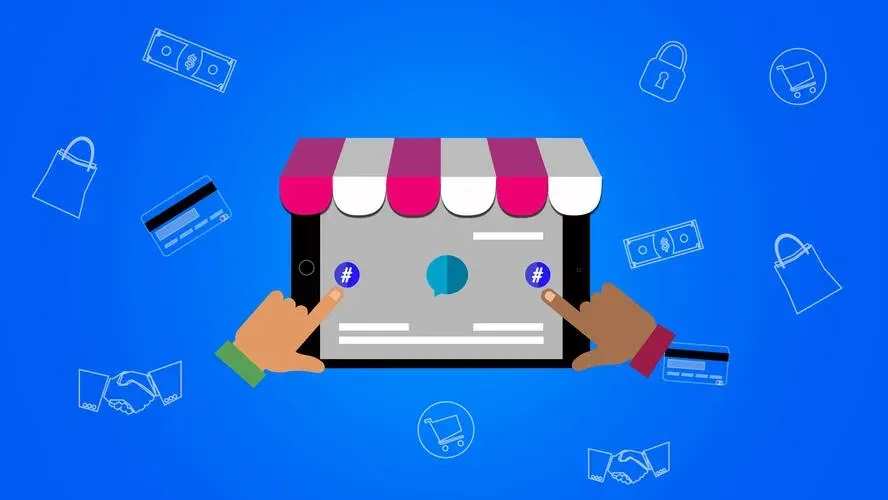Ecommerce hosting provides the web hosting platform and required services needed to have an online store. From the domain name to online storefront, shopping cart and even inventory management, all can be provided by an Ecommerce hosting company.
Running an online business is tough, but having the right Ecommerce hosting package will make managing it easier. Whether you’re trying to promote your online business, make sales or increase traffic to your site, understanding Ecommerce hosting is crucial.
We have outlined the key features of Ecommerce hosting . By the end of this article you should be familiar with how it works, what type of hosting is best for Ecommerce, and platform comparisons.
What Is Ecommerce Hosting?
Ecommerce hosting acts in the same way as web hosting, however it is catered specifically for Ecommerce sites.
This means that the usual elements of a hosting package are provided, such as space on the host’s server to store your site data, bandwidth and technical support. However, a package for Ecommerce hosting would also include all the elements needed to maintain the smooth and secure performance of your online store. Without ecommerce hosting, you wouldn’t be able to sell a thing online.
In addition to a hosting package, it’s common for Ecommerce packages to also offer services that will assist with set up and maintenance, like domain registration, web design, payment processing and even marketing. This ensures that your online store has everything that it needs from beginning to end.
How Does Ecommerce Hosting Work?
Every Ecommerce store needs the same thing, an online storefront. In this case the storefront is your website. The name and address of the store is the domain name. The space that your online store occupies is on a server. You pay rent to the owner of that space, your hosting provider. Many hosting providers also offer services beyond basic setup.
This is what you need to get started:
- Domain registration- a name and address for your online store
You’ll need to register a domain to host your site. Your hosting provider can get you sorted with a domain name.
- Hosting- renting space on a server for your website data
If you want a website to connect to the internet, it needs to have space on a server. Whether you need shared space or a dedicated space will depend on the resources your site requires.
- An Online Storefront - a website or website builder tools to design your store
You need to have a website and it needs to look good. You can get your site designed professionally or you can use website building tools and templates provided by your Ecommerce hosting service.
- Payment processing ability
You’ll need an eCommerce tool that’s capable of accepting payments. An eCommerce platform like WooCommerce or Magento can help you build your store and include the plug-ins capable of taking payments. There are some tools, like Shopify, that will take care of the hosting for you as well.
After these steps, you're ready to go. But, there are several other features provided that will boost your Ecommerce development:
- Email management systems
Being able to create, send and manage emails from professional email accounts lend credibility to your business.
- SSL certificates
When dealing with financial transactions and sensitive data, it’s essential to have the security to keep you and your customers safe and secure.
- Marketing services
If you want to increase your customer base, it’s crucial to take advantage of Ecommerce marketing features. Incorporating SEO tools, social media integration and analytics offered by your Ecommerce hosting platform will take your business to the next level.
What Types of Hosting Work Best for Ecommerce?

All hosting works, but some work better than others. Get to know what the demands and needs of your website are, considering cost efficiency, performance and resources required. Then match those needs with the type of hosting package best suited for you.
Shared Ecommerce hosting - The cheapest option. Here your site and store will be on a server with dozens of other businesses. You’ll each be given a portion of the server space, but in some instances, you could experience speed interruptions. This could occur as your neighbors compete with you for resources; especially during high traffic times
Dedicated servers for Ecommerce Hosting - Here you’ll get your own private server. This is ideal for large businesses that expect a lot of traffic. Being on a private server means no resource sharing, and bandwidth is dedicated to running an efficient site
VPS Ecommerce hosting - Similar to shared hosting, your site will be housed in servers with other businesses, but here, your neighbors can’t muscle in on your resources
Cloud Based Ecommerce Hosting - A good choice for businesses that outgrow the limits of shared hosting. Here you’ll have access to resources across a whole data center with on-demand usage of power
Hosted Vs. Self Hosted Ecommerce Platforms
Hosted eCommerce platforms cover the hosting for you, while self-hosted supply the store building tools only, and you’ll need to find a host like Verpex to house the site.
WooCommerce - This is one of the most popular self-hosted platforms. It has a huge number of extensions, good out-of-the-box functionality and a simple UI that newbies will appreciate. You can check out more on how it all works over on our WooCommerce hosting page.
Magento - This platform is designed for large enterprises and big businesses. Magento is self-hosted and is set up to cater to thousands of sales and transactions each day. Many global corporations use it to build online stores.
At Verpex we offer tailored Managed Magento Hosting for those who want to make things easier and more user-friendly.
Why is Ecommerce Focused Hosting So Important?

Performance
Speed is vital for any eCommerce store. If customers can’t buy your products quickly, or it takes too long to get to the checkout, then there’s a good chance they’ll abandon their carts and leave your site.
Some stores, like WooCommerce, come optimized for speed already, and our in-house experts at Verpex can ensure you aren’t running any plug-ins that might slow down your site
Encryption
This is a must for any new eCommerce store. You’re going to be handling a lot of personal data, financial information, and credit and debit card details, so you must use an encrypted connection. It’s becoming standard across the industry now to provide SSL certificates.
At Verpex, we’re no different, and take your security very seriously indeedBandwidth and file storage
This all depends on what you want to get out of your website. Obviously, smaller websites and stores won’t need a lot of storage and can happily use cheaper shared hosting packages, However the larger your website becomes, and the more traffic you have, the more bandwidth and storage you’ll need.
Luckily, all types of hosting plans can be scaled up or down relatively easily. Before you choose your package, consider how much traffic you expect your site to havePCI Compliance
Payment Card Industry (PCI) compliance is a set of mandatory regulations put in place to ensure the security of credit and debit card transactions online. The onus is very much on you to get this right and you can’t rely on the data host to ensure compliance.
Instead, make sure you install the correct add-ons and security tools that come bundled with your eCommerce platform. Providers like WooCommerce make this easy to do and it shouldn’t take long at allBackups
We’d always recommend choosing a host that offers data backups. In the event of a cyberattack, it’s important you’re able to roll back to a previous version of your store so you can be ready and selling again in no time.
Depending on how large your store is, and how many transactions you have, you might want to consider weekly, daily, or even hourly backupsAccount limitations
Always check the fine print of both your eCommerce platform and your hosting plan to make sure it’s definitely the right one for you. Check how much extensions and add-ons are going to cost, whether you’ll get a free SSL certificate, find out what sort of reporting analytics are available and what sort of fees you might pay for exceeding bandwidth limits.
It’s best to plan out expectations for your site and store in advance of signing up to any plan and to not go in blindSupport
24/7 support is an absolute necessity. A lot of self-hosted eCommerce platforms might not have any support teams you can contact, so you’re going to need to rely on the data host for your day-to-day maintenance.
However, a lot of eCommerce platforms are open-source, meaning developers from around the world are continually working on them; you can find a wealth of guides and blogs covering the finer points of most. Verpex offers 24/7 support to cover technical issues across a range of different eCommerce platformsIntegrations
Some eCommerce platforms integrate better with different types of hosting than others. For example, WooCommerce is a WordPress-only plug-in so it must be integrated with a WordPress hosted site.
Outside of this, each eCommerce tool has a huge range of extensions and plug-ins that cater to a whole range of different tasks and services. This is about the goals your business is trying to achieve, and you need to choose a platform that has the best integrations to help you meet those goalsDeveloper-friendly environment
Again, this depends on what you want to get out of your store. If you’re a web development wizard with excellent coding skills, you might want to try the customization offered by Magento.
Or, if you’re a brand new entrepreneur setting up your first store, you might want to give Shopify or WooCommerce a try. Both have much more developer-friendly interfaces
Why It’s Important to Choose the Right Ecommerce Host?
Picking the right host can set the tone for your whole eCommerce store. Choose poorly, and you could be stuck in a contract with sluggish speeds and limited customer support. Get it right though, and you can end up with a package perfectly tailored to meet your specific business needs.
Criteria for Choosing an Ecommerce Hosting Provider

Budget
If you’re running a basic store, you can get a shared hosting plan for just a few dollars per month. However, for a beefier store, hosting prices can start from around $109 per month

Development experience
Realistically assess your skills and evaluate how much time you can put into development. Speak to a service agent about the best plans to match your level of experience

Support
You need a provider that can offer multiple avenues to raise issues, including over the phone, via live chat and by raising email tickets. Luckily, Verpex provides all of this and more

Security
Most eCommerce stores come with add-ons and extensions that can enhance your cyber defenses, and a data host should have the knowledge and skills to help recommend which ones will be best for your site

Uptime guarantee
Every minute your store or website is down means lost business for you. Accept nothing less than a 99.99% uptime guarantee from your eCommerce host in order to ensure the smooth running of your site
Ecommerce Platform Comparisons
WooCommerce Vs. Shopify
WooCommerce is self-hosted, cheap and customizable. The perfect choice for mid-sized businesses. Shopify on the other hand provides the hosting for you, is very user-friendly and aimed at taking the pressure of newbies.


WooCommerce Vs. Magento
Magento is a big step up from WooCommerce in terms of customizability and handling traffic. It’s perfect for large enterprises that have thousands of daily visitors to the store. It can be quite expensive, and WooCommerce offers a reasonably-priced alternative.
Summary
Your eCommerce hosting choice is so vital because your online store is the heart of your business. Therefore It needs to be:
- secure
- within your budget,
- able to handle expected amounts of traffic,
- have plenty of useful integrations
- Optimal performance
While Verpex can offer hosting packages to meet just about every business need, we’d always recommend you sit down and do a little research on your business needs first.
Ask yourself how many customers you expect, how much storage space you need and what you’d like to get out of your store

Frequently Asked Questions
Does my ecommerce store need to be PCI compliant?
Yes, if you’re going to be accepting payments via credit and debit card you’ll need to meet PCI regulations.
How customizable is my ecommerce store?
This depends on the eCommerce tool you use. For example, Magento is 100% customizable, and you can amend just about every aspect. Shopify on the other hand has far fewer customization options.
Is there a money-back guarantee?
Yes, Verpex offers a 45-day money-back guarantee if you're not satisfied with your eCommerce hosting.
Can I move over an existing domain?
Yes, we make it easy to transfer over any domain or eCommerce store to our hosting plan.

I've been navigating the web hosting waters for years now. As the Chief Editor at Verpex, I team up with some awesome writers to dish out the good stuff on hosting. Got a Master's in Journalism, so I always have an eye out for quality. Whether you're just dipping your toes or you're a seasoned surfer, I'm here to make everything web hosting feel like a breeze
View all posts by Julia Lozanov

















